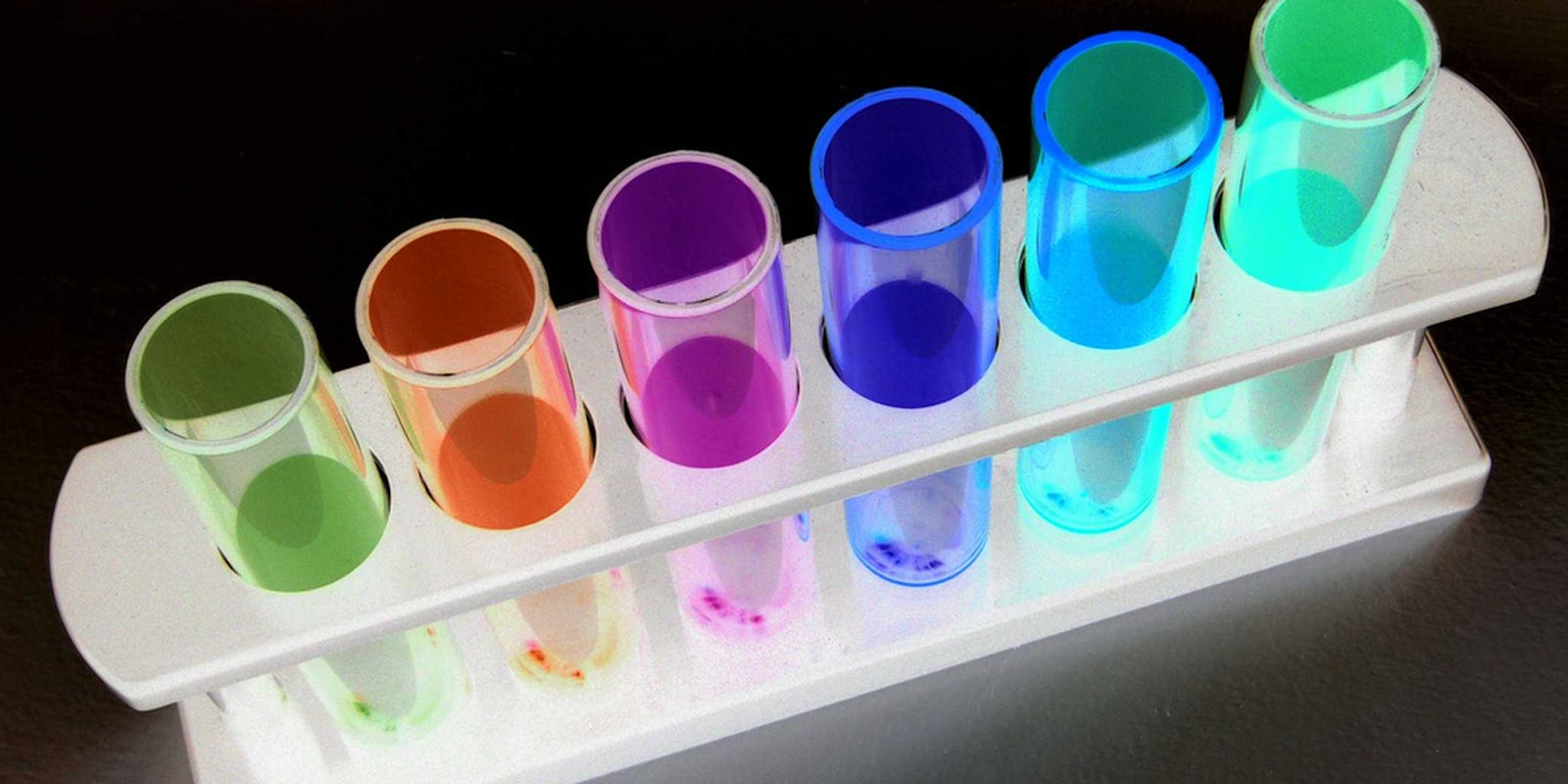Thanks to Tinder and OKCupid, it’s never been easier to find the love of your life on the Internet. But what happens after you find that person? It’s pretty much a crapshoot, because as of yet, there’s no magic formula to determine whether or not two people are actually romantically compatible.
The DNA matching startup Instant Chemistry, however, thinks it’s found that formula, and it’s as simple as expectorating into a tube. That’s why they’ve partnered up with the dating website Singld Out to offer DNA kits to users, to help determine how genetically compatible you are with a potential mate. All you have to do is fill out a brief personality assessment, send a saliva sample, and wait and see if you’re a match made in the genetic heavens.
As I found earlier this year when I wrote about gene-matching dating apps, the science of determining romantic compatibility based on your genes is iffy at best. While there’s some indication that certain genes that regulate your immune system play a role in sexual attraction, evidence of magic hormones or pheromones that render you irresistible to the opposite sex is scant.
Instant Chemistry, however, isn’t using genes as the only predictor of compatibility. By giving couples DNA-matching kits and personality assessments, they’re trying to give you another tool to whittle down your options in an already-saturated online dating pool.
“There’s a huge amount of unpredictability when you meet someone and you’re trying to determine whether you have chemistry or not,” Ron Gonzalez, the cofounder of Instant Chemistry, told me when I wrote the aforementioned story. “If we can reduce that unpredictability even by 20 percent, that’s a huge saving of your time and effort while you’re trying to find a partner.”
Because I’ve lived with my boyfriend Alex for the past three years, I’ve been out of the dating game for quite some time. Nonetheless, I wanted to see how accurate Instant Chemistry was at gauging our compatibility. So I emailed their press representative, convinced my editor to foot the $200 bill for our DNA kits, and waited for them to arrive in the mail so we could see if we were DNA-compatible or not.
Day 1: The kits arrive in the mail in two separate cardboard packages, with extremely detailed instructions on how to send and package our DNA samples. The instructions tell us that to preserve the accuracy of our lab results, we have to send in our kits within a week of receiving them. We wait about nine days, because we were really busy watching the U.S. Open and finishing the second season of Queer as Folk on Netflix.
Day 9: The U.S. Open draws to a close and after some gentle persuasion (me screaming “DO THIS THING FOR ME NOW-NOW-NOW OR I WILL NEVER GIVE YOU [INSERT OUR EUPHEMISM FOR ORAL SEX HERE] AGAIN”) Alex agrees to take the DNA test.
First, we log onto our Instant Chemistry accounts and are prompted to fill out a series of 24 questions in an online personality assessment. These questions are, in a word, lame, but in the interest of science I try to be as honest as possible. For the most part, they seem targeted at revealing the extent of my unwillingness to interact with people:
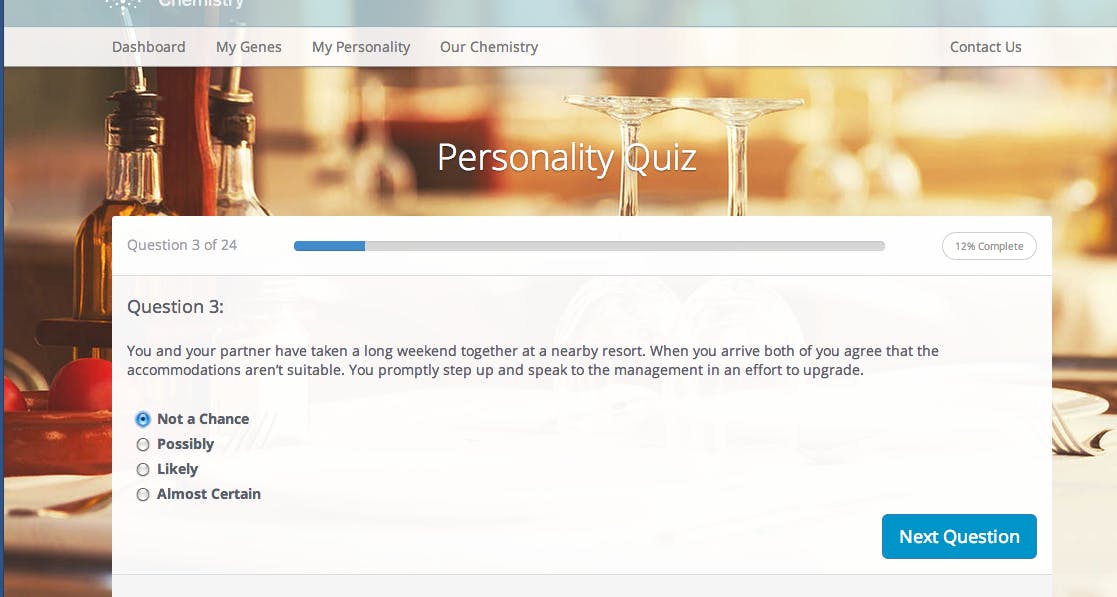
Not a chance.
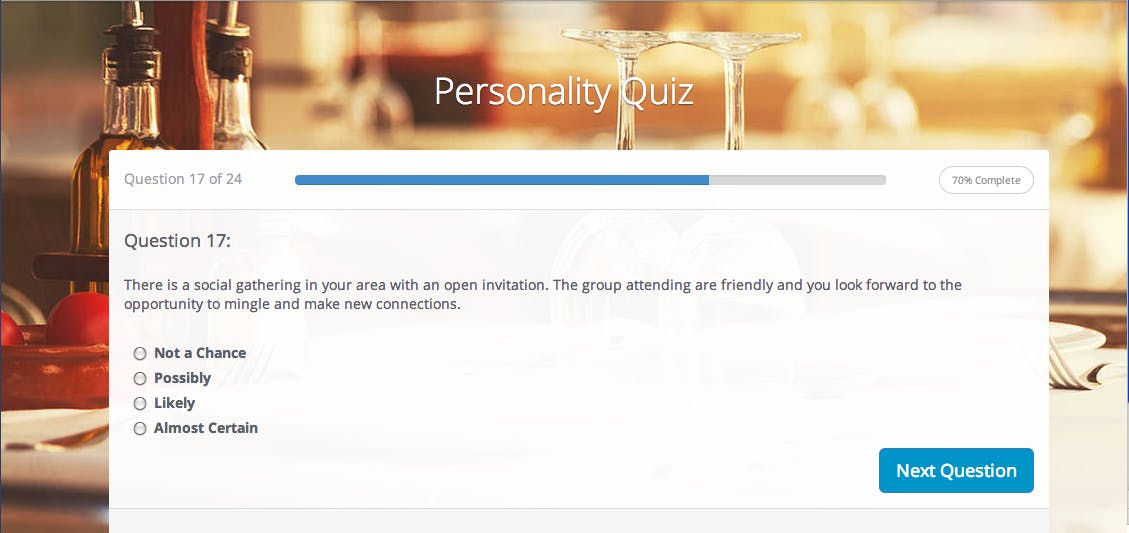
Is the social gathering at a Vietnamese sandwich shop? Are there copious amounts of attractive nude people and/or grain alcohol? If neither, not a chance.
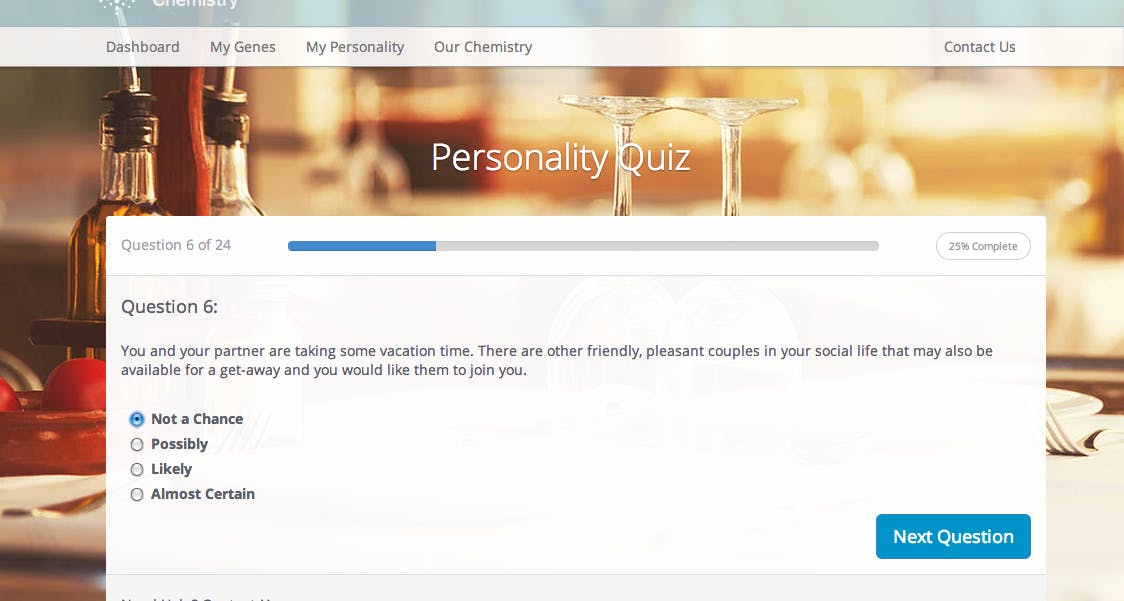
“Friendly, pleasant couples”? What? I mean, I don’t know anyone outside an L. Maud Montgomery novel whom I’d honestly describe as “friendly” or “pleasant.” Let alone couples. People in relationships are the worst, and I say this as someone who is in one. Come to think of it, actually, I have yet to meet another couple whose heads I haven’t wanted to smash together like two coconuts. So… yeah. Not a chance.
Although I’m not supposed to look at Alex’s quiz, I happen to take a peek at his answers to these questions, which surprisingly run the gamut from “possibly” to “almost certain.” I’d always assumed Alex was as misanthropic as I was, but clearly that’s not the case. I begin to grow concerned about our results, but my fears are put to rest when he turns to me and says, “This is boring. They should’ve had a question about when your partner gives you a stupid quiz to take.” That’s my boy.

Alex taking his Instant Chemistry personality test.
Day 10: The next day, we take out our kits and read the instructions, which are considerably more elaborate than we expect. Basically, we have to spit in two separate tubes, which are divided into two chambers, one of which contains an unidentified blue liquid substance. When we’ve provided our saliva samples, we’re supposed to release the chamber so it mixes with the blue liquid.
This sounds fairly straightforward, but the whole process takes about 10 minutes, in part because it takes some time to get over how grossed out we are. Note to couples who might want to take Instant Chemistry’s test: Try listening to your partner swish drool inside his/her mouth for a few seconds. You will never want to have penetrative intercourse again.
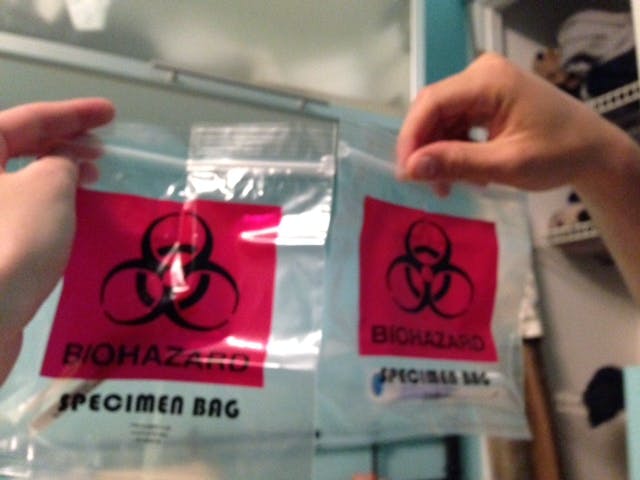
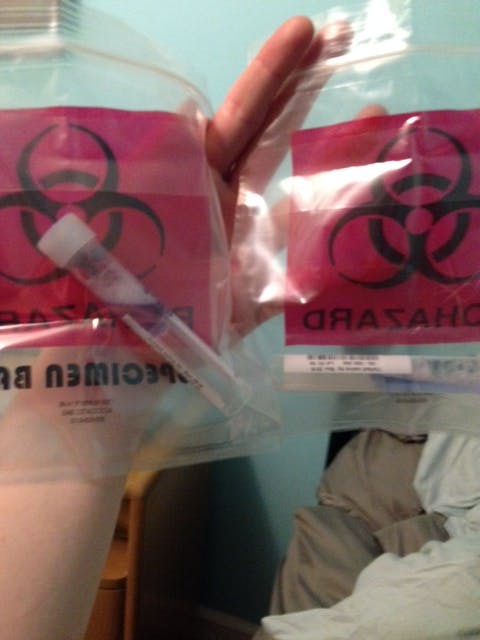
After we’ve provided all the saliva we can muster, we seal the tube and place them inside two separate envelopes, which I mail out the following day. (Fun fact: I hadn’t sent anything via snail mail in so long that a kindly Indian laundryman had to teach me how to open the mailbox and put my package inside.)
Day 20: After about 10 days, we receive an email from Instant Chemistry telling us that our lab results had been processed and are available online. I ask my boyfriend what he thinks they’ll tell us.
“Probably that we’re dying of lupus,” he says. “What about you?”
“That we have identical genes because we’re actually cousins and our children will be hunchbacks with flippers,” I reply. I am of Ashkenazi Jewish descent, and my boyfriend is half-Italian Catholic, half-descended from Eastern European Auschwitz survivors, so this fear is actually not far off. I don’t know a lot about the lives of my ancestors, but I do know from recent genetics studies that between eating smoked fish and hiding from Cossacks, those peasant shtetl Jews spent an awful lot of time sleeping with one another.
We open the results, and they are underwhelming, to say the least. First, I pull up the breakdown of my HLA, or biological compatibility, genes, as well as my “emotional response” gene:
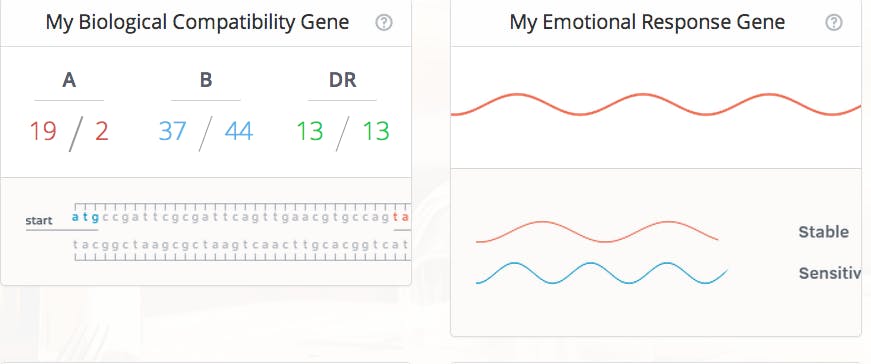
Although the summary of my HLA genes are almost completely incomprehensible, I’m amused by the analysis of my “emotional response” gene, which says I have a “long” version of the serotonin gene: “In the presence of strong positive and strong negative emotional situations, a person with the long version of the serotonin gene is more likely to display a leveled or stable emotional response.” As someone who is probably as emotionally stable as Mount Etna, this could not be a more inaccurate description of my personality.
Then I move onto an analysis of my personality, which is organized into four different areas: dominance, social, intimacy, and submissive. My results are about on par with Alex’s, except he ranks higher than I do on the “social” scale. Considering how often people go out of their way to tell me how much more charming and likable he is than me, this actually sounds about right.
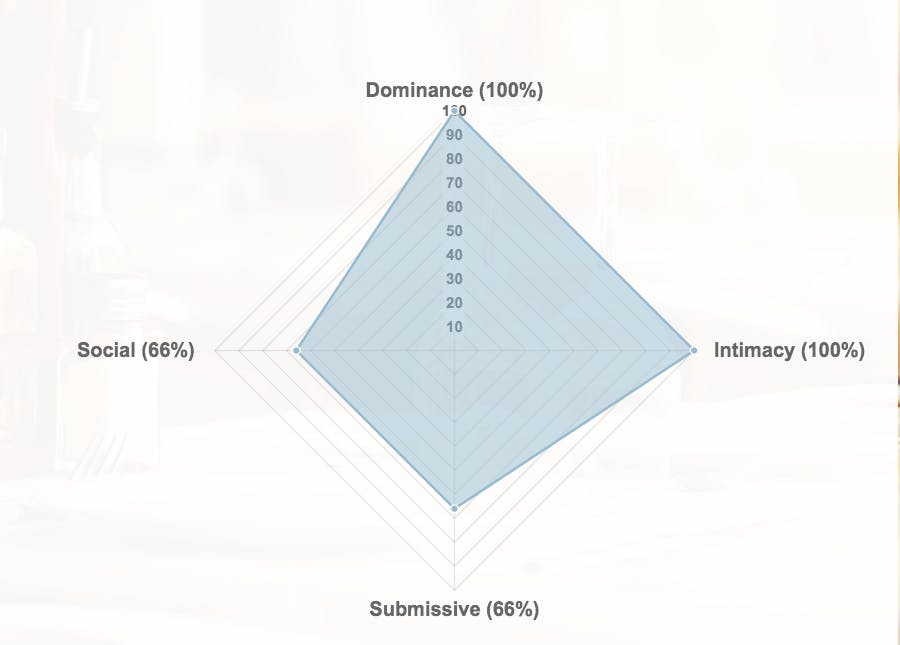
Then we get to the main event: the “Our chemistry” category. Thankfully, Instant Chemistry doesn’t tell us that we’re dying of lupus. In fact, it tells us we’re 84 percent compatible, which is an “overall great match percentage”:
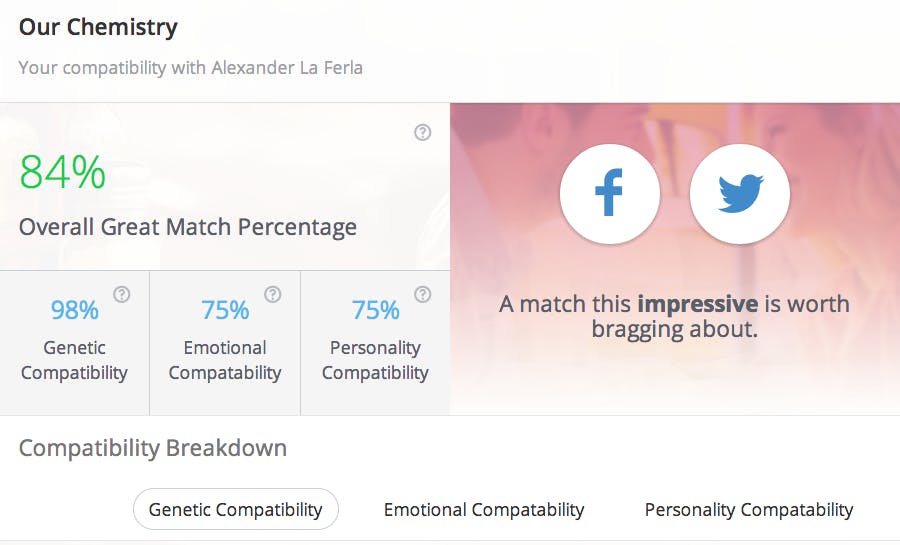
Then it goes on to assess our compatibility based on three different factors: genetic, emotional, and personality. Apparently, Alex and I are one of the 10 percent of couples who are more than 96 percent genetically compatible, meaning that my genes are “extremely different” from his. Guess that takes care of the children with flippers concern.
We are slightly less well-matched, however, according to the emotional and personal compatibility metrics, scoring 75 percent on both. Apparently, although we are both “moderately socially oriented” (?) and “highly desirous of personal affection and intimate disclosure,” we’re both “strong-willed,” which means we “may clash at times.” Considering we once got in a heated three-hour debate over the lyrics to Todd Rundgren’s “Bang The Drum All Day,” this isn’t exactly news to us.
We also score 75 percent on the emotional compatibility metric, because we have “differing responses to emotional change” in our relationship. According to Instant Chemistry, this means that the highs and lows of our relationship impact Alex more than they do me: “This is important to recognize as one of you may wonder why the other person is having such a strong reaction, while that person wonders why you don’t seem to have any emotion.”
While this might sound like the most foreboding aspect of our compatibility test results, it actually struck me as the most enlightening, but not for the reason you might expect. Both Alex and I are incredibly hot-tempered and stubborn, to the point where our relationship has probably suffered most precisely because of how similar our emotional responses are. The fact that Instant Chemistry gleaned the total opposite from a 24-question personality test made me realize just how flawed their method of determining compatibility is.
Overall, I found Instant Chemistry shockingly unenlightening for how much it cost; were my kit not comped, I probably would’ve thrown a fit and demanded my money back. (There’s my stable emotional response gene at work!). If there is a magic bullet for determining partner compatibility, this isn’t it: As Alex put it, “It pretends to give you all this information, but when you read it carefully it’s actually meaningless, non-specific bullshit.”
In the end, I did learn one thing about my long-term compatibility with Alex from Instant Chemistry: We both thought it was complete nonsense. And ultimately, I think that bodes well for our romantic future.
Photo via Raymond Bryson/Flickr (CC BY 2.0)

